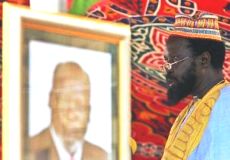Sudan national unity govt faces tough task
Sept 21, 2005 (KHARTOUM) — Sudan’s national unity government was born of months of intense jockeying between former foes and now has six years to make a united Sudan appear an attractive option to a largely pro-secession south.
 The unity cabint was announced late Tuesday, ending a bitter bout of wrangling over the line-up between the president’s ruling party and former southern rebels.
The unity cabint was announced late Tuesday, ending a bitter bout of wrangling over the line-up between the president’s ruling party and former southern rebels.
“This government is a good omen and represents the will of the Sudanese people to establish peace and consolidate national unity,” President Omar al-Beshir said.
The establishment of the interim joint administration represents a landmark in shoring up the January peace deal that ended 21 years of civil war in Africa’s largest country.
The interim government will remain in place until legislative elections in around four years. A six-year post-war interim rule started in July, at the end of which the south will hold a referendum on self-determination.
David Mozersky, an analyst with the International Crisis Group think-tank, said the formation of the government could speed up implementation of key features of the peace process.
“The worrisome thing that emerged however is that, more and more, each and every step along the way appears to be up for discussion and is re-opened for negotiation,” he said, pointing out that the cabinet was formed almost two months late and only after bitter wrangling.
One of the main bones of contention was the distribution of key portofolios, such as energy and finance. Beshir’s National Congress Party was finally handed both.
The former rebel Sudan People’s Liberation Movement (SPLM) obtained nine portfolios — including the foreign ministry — but the old northern regime retains the bulk of the key jobs, a pattern that could fuel southern sentiment.
“Even if the SPLM had all the top jobs, the process of making unity attractive would be very long and difficult,” analyst David Mozersky told AFP. “It’s a matter of changing a whole system and the way the government treats people.”
The mainly black Christian southerners say they are still treated as “second class citizens” or “slaves” by the mainy Arab Muslim north and suspect that Khartoum’s current peace efforts are not sincere.
Khartoum has also faced charges of attempting to sow division in southern ranks, as Beshir’s regime is not expected to relinquish power easily.
The peace process suffered a massive blow when John Garang, the historical southern rebel leader who staked much of his prestige on the January agreement, died in a helicopter crash on July 30.
His untimely death slowed down the formation of the unity government, but his successor Salva Kiir has so far silenced doubts that he might not be up to the task and has reaffirmed his commitment to peace.
Yet the south harbours much of the country’s oil wealth and is already largely autonomous, and leaders on both sides could struggle to convince the southern population that they will benefit from unity.
The international community has been active in south Sudan, mainly through aid and investments for the devastated region. But Mozersky believes the peace process also needs more guarantees.
“There is a need for a re-engagement of the international community, which currently does not have a clear role in overseeing the peace process, and should be holding the parties to the spirit and timeframe of the agreement”.
The deal that ended the continent’s longest-running civil war is seen as a potential example for other conflicts and some 10,000 UN peacekeepers are being deployed in a bid to stabilise the area, which is half the size of western Europe.
After two decades of war that left two million dead and twice as many displaced, the south lacks infrastructure and faces years of hard work to clear mines, repatriate refugees, build roads and develop a local economy.
The threat of famine still looms in the south, while unrest continues in other parts of Sudan, such as Darfur in the west and the Red Sea state in the east, further threatening the wider process of national reconciliation.
(AFP/ST)
